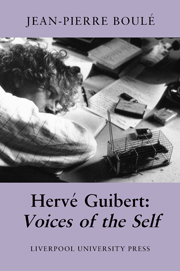Book contents
- Frontmatter
- Contents
- Acknowledgements
- List of Abbreviations
- Introduction
- 1 Youthful Writings
- 2 Photographic Writing
- 3 Towards the Novel
- 4 Image and Text
- 5 The ‘Novel’
- 6 ‘Autobiography’
- 7 Towards the roman faux
- 8 The roman faux
- 9 Thanatographical Writing
- 10 The Fictitious, the Fake or the Delirious
- Conclusion
- Notes
- Bibliography
- Index of Names
- Index of Notes
6 - ‘Autobiography’
- Frontmatter
- Contents
- Acknowledgements
- List of Abbreviations
- Introduction
- 1 Youthful Writings
- 2 Photographic Writing
- 3 Towards the Novel
- 4 Image and Text
- 5 The ‘Novel’
- 6 ‘Autobiography’
- 7 Towards the roman faux
- 8 The roman faux
- 9 Thanatographical Writing
- 10 The Fictitious, the Fake or the Delirious
- Conclusion
- Notes
- Bibliography
- Index of Names
- Index of Notes
Summary
In analysing Mes parents we will see from the outset that its contents are found in other books, pointing us in the direction of what is fundamental in this work, its form rather than its content. Indeed on the back cover the book is called ‘autobiographie de jeunesse’ (‘autobiography about his youth’), and the author will write the ‘je’ (‘I’) of a narrator who is identifiable with Guibert. Will the book fulfil its desired function? That is the question which my analysis, backed by the thematic of the text, will seek to answer.
MES PARENTS
The chronological order was not respected for Mes parents because it made sense to study the books bearing the label ‘roman’ (‘novel’) in the same chapter, but that does not mean the work's publication date (between Des Aveugles and Vous m'avez fait former des fantômes) will be ignored: on the contrary, this book proves that in 1986 Guibert was writing more than just ‘romans’ (‘novels’). At the same moment as he was trying to eclipse himself from the narrative, he was about to write himself into a book in the most compromising manner possible.
The deception is present from the paratext onwards. The back cover of Mes parents announced ‘une autobiographie de jeunesse qui, comme une enqu≖te, a la charge d'étayer indices, accusations ou démentis’ (‘a youthful autobiography which, like an investigation, involves backing up clues, accusations or denials’), but it is noticeable that despite the interest generated by the eight questions on the back cover, this plot covers roughly 15 pages, that is less than a tenth of the book.
- Type
- Chapter
- Information
- Hervé GuibertVoices of the Self, pp. 145 - 158Publisher: Liverpool University PressPrint publication year: 1999

